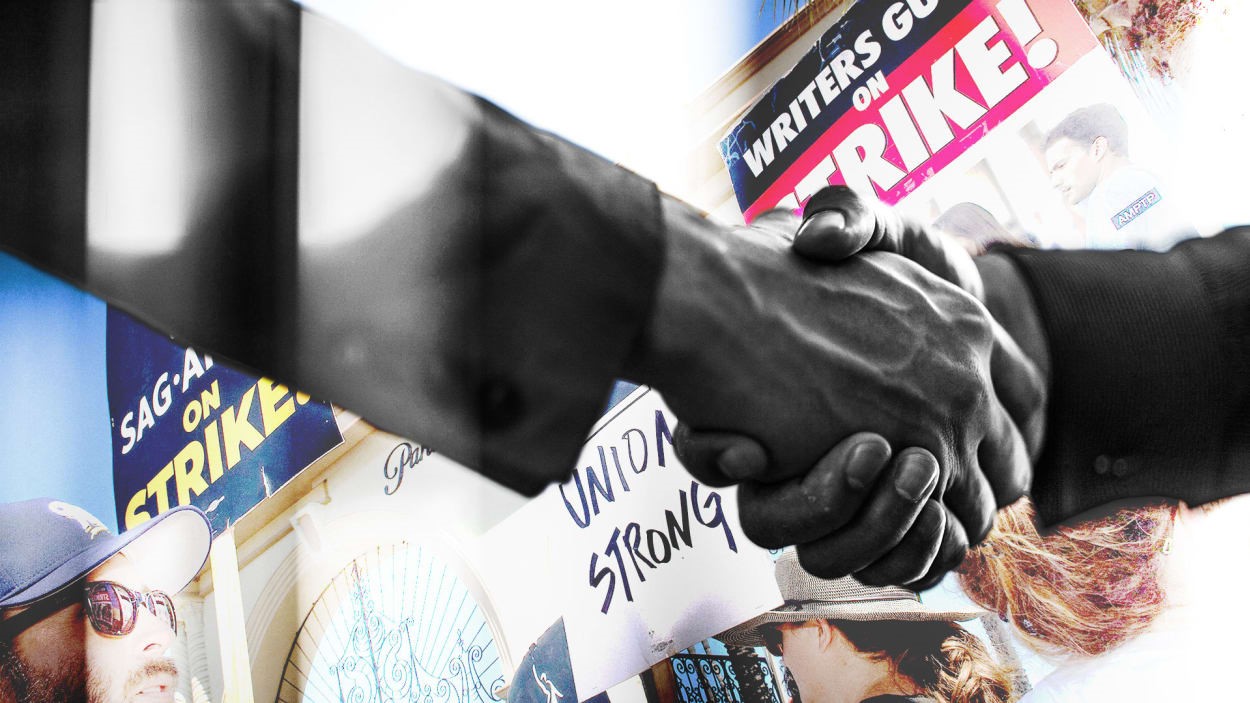By Chris Morris
Hope could be on the horizon with the long-running strike by the Writers Guild of America (WGA).
The WGA and the Alliance of Motion Picture and Television Producers (AMPTP) issued a rare joint statement Wednesday, noting that the two parties would meet face-to-face again on Thursday. That was the first time the two have issued any sort of joint announcement since the walkout began on May 2, indicating a possible sense of optimism about the talks.
Wednesday’s negotiations with representatives for the writers included some of Hollywood’s biggest CEOs, including Disney’s Bob Iger, Netflix CEO Ted Sarandos, and Warner Bros. Discover CEO David Zaslav. All are expected to be at the table again for Thursday’s negotiations, which began at 12:00 noon ET/9:00 a.m. PT.
The recent talks are the first sit-down since negotiations reached a standstill in late August. Since then, executives have spoken more candidly about needing to end the labor dispute. In early September, Zaslav, speaking at a Goldman Sachs conference, said, “We’re a content company. We’re a storytelling company. And we need to do everything we can to get people back to work. . . . We really have to focus as an industry, and we are, on trying to get this resolved in a way that’s really fair.”
Those comments came a day after Warner Bros. Discover said it expected its earnings to take a hit of between $300 million and $500 million due to the strikes. The strike is estimated to be costing California’s economy $30 million a day at present.
That figure could go even higher if the strike continues into 2024, as the state recently passed a bill to give striking workers unemployment benefits. Governor Gavin Newsom now must decide whether to sign the bill into law. If he does, it would go into effect in January.
Hollywood writers brought the production of TV shows and movies to a standstill 141 days ago, saying their compensation is insufficient, given the jump in revenues that streaming services have brought in. They’re seeking compensation through the preproduction, production, and postproduction periods, compared to now, when they’re often asked to revise a script without being paid.
Writers are seeking a notable hike in guild minimum weekly payments and changes to working conditions (with minimum staffing levels for TV writers rooms and a guaranteed minimum number of weeks per show). In addition, they’ve asked for residual payments based on the number of views a show gets on a streaming platform, something studios have historically been opposed to.
They’re also seeking to ensure they are protected from any artificial intelligence encroachments, but are not seeking to completely forbid the use of AI in screenwriting.
Studios have said they want “a fair and reasonable agreement.”
Optimism doesn’t mean the strike is certain to end, however. Negotiations are ongoing and could still break down. It’s also still unclear if any part of the 2023-2024 television season can be salvaged at this point. (Several films have already been pushed into 2024 due to the strikes.)
Should WGA officials strike a deal, it will still need to be certified by union members before they put down their picket signs. Depending on when that happens, it could make this strike the longest in the guild’s history, surpassing the 1988 strike, which lasted 154 days.
Even if the WGA and AMPTP do resolve their issues, there’s still a matter of finding actors. The Screen Actors Guild has been on strike for 68 days now and AMPTP would need to reach a separate agreement with that union in order for Hollywood to get fully back to work.
(1)







